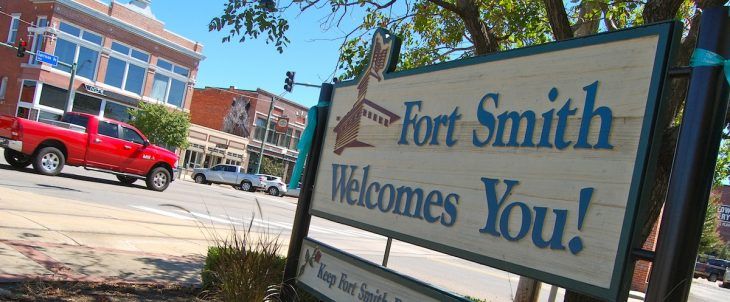Fort Smith Board repeals ‘panhandling’ ordinance after pushback from ACLU
by February 28, 2018 10:48 am 791 views

In light of a legal challenge from the American Civil Liberties Union (ACLU) and at the recommendation of the Arkansas Municipal League’s Legal Defense Program (AMLLDP), the Fort Smith Board of Directors voted unanimously on Tuesday (Feb. 27) to repeal city ordinance number 34-17.
The ordinance became informally known as the “panhandling ordinance” when adopted in July 2017 as it enacted prohibitions on the occupancy of roadway portions on public rights-of-way. It also established procedure for obtaining a special permit for groups and organizations that wished to use a “laned roadway” to solicit funds — for example, a “Fill the Boot” Drive popular among fire departments and charities.
AMLLDP attorney Michael Mosley advised the city to repeal and adopt a “wait-and-see approach” with similar ACLU lawsuits against the cities of Rogers and Hot Springs pending. Mosley said those two cases would be resolved “on paper, in briefs, and not in a trial setting,” adding that the Rogers brief is due on Friday and he would be taking the plaintiff’s deposition in the Hot Springs case on Monday.
Mosley’s recommendation for repeal comes after conferencing with the ACLU attorney, who told him the organization would be willing to accept a motion to dismiss as moot if the city fully repealed. While Mosley is willing to argue the city’s purpose for the ordinance was public safety-inspired and not targeting, the ACLU stance is that the ordinance was specifically enacted to punish panhandling, a First Amendment-protected right, while “distinguishing between speakers” through the special permitting provision.
To the last point, Mosley said it was possible to make distinctions about different speakers, but “it’s got to pass a very rigorous standard called strict scrutiny,” and historically, courts have not favored such attempts. However, with the repeal of Ordinance No. 34-17, the city’s desire to curb panhandling activities is not without recourse.
Under Title 27 of Arkansas Code, citations can be issued to pedestrians who improperly use intersections and roadways (i.e., impeding traffic, jaywalking). Mosley advised the city to enforce state law instead of setting its own course.
“That insulates you from lawsuits and the possibility of having to pay attorneys’ fees,” Mosley said, adding that when enforcing the state law, the city should not target one group specifically, but “ticket everybody,” who improperly uses a roadway.
In a recent statement addressing the cases from the ACLU of Arkansas legal director Holly Dickson said a ban on asking for assistance “is a ban on speech,” further stating the Hot Springs, Rogers, and Fort Smith ordinances “violate the First Amendment and should not be allowed to stand.”
The organization filed the Fort Smith lawsuit on behalf of Glynn Dilbeck, who was only guilty of asking for help, according to Rita Sklar, ACLU of Arkansas executive director.
“If people are uncomfortable seeing people who are poor or homeless, they should address the root causes of poverty and improve the quality of life of all their neighbors, rather than trying to sweep the problem under the rug,” Sklar said.
In addition to repealing Ordinance No. 34-17, the Board also voted unanimously to amend Section 18-72, which had prohibited begging in all parks within the city limits.
